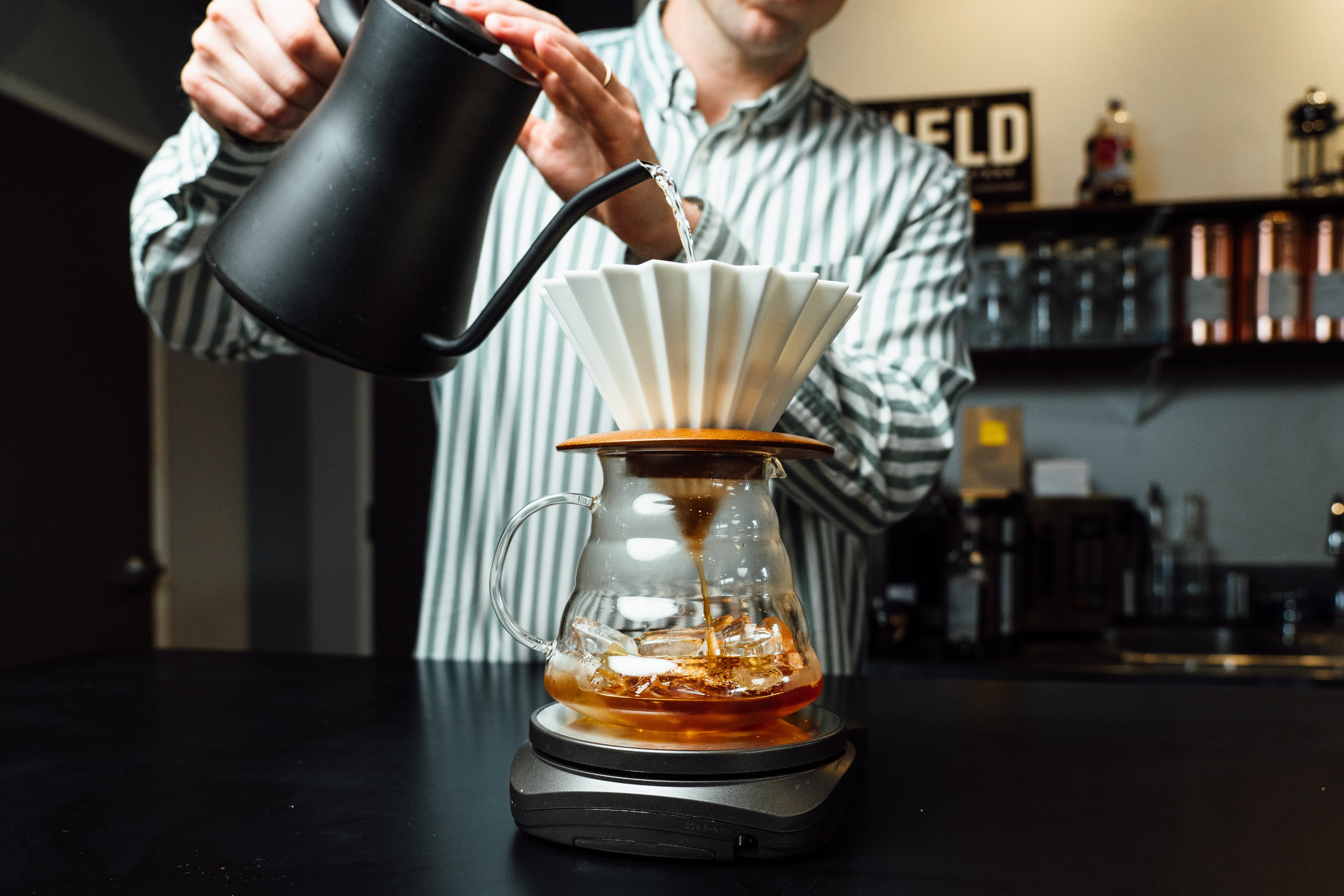Free Shipping on Orders Over $50

There's something delightful about the aroma of freshly brewed coffee and the clean, bright atmosphere of a modern coffee shop. It's a space that evokes simple pleasures, meaningful connections, and, of course, that perfect caffeine boost. Perhaps you dream of creating your own such haven – a place where your values, passion for quality, and desire for community come together.
Turning this dream into a thriving business takes more than just a love of lattes. It requires careful planning, a refined vision, and a lot of hard work. Let's start this journey and explore how you can make your coffee shop dreams a reality!
Why Do You Want to Open a Coffee Shop?
- Is it about crafting a lifestyle? Owning a coffee shop often means long and sometimes unpredictable hours. There will be early mornings and busy weekends. But the rewards can be immense if you envision a fulfilling lifestyle with creative freedom and the chance to cultivate your own work environment. Do you seek a flexible schedule that could potentially balance with family life or other passions? Are you ready to trade the structure of a traditional 9-to-5 for the dynamic life of a small business owner?
- Where does your passion align? What excites you most about the world of coffee? Is it mastering the art of the perfect espresso shot, the quest to source local ingredients, serving people you love, or perhaps the joy of creating a welcoming space for your community? Identify your niche; it will become the heart of your coffee shop's identity.
- What experience and skills are you bringing to the table? Be honest with yourself about where your strengths lie. Have you worked in cafes, restaurants, or other customer-facing roles? Are you comfortable with the business management side of things—marketing, finance, even basic HR? Identify areas where you might need to level-up, whether it's mastering latte art or finding a crash course in small business accounting.

Basic Startup Steps
- Develop your coffee shop concept. This next question is one of the most important questions you can thoughtfully think through and answer. How will your cafe stand out from the crowd? This is where your brainstorming gets exciting and tangible! Consider these aspects:
- Exploring Your Niche
- What will make your coffee shop truly special? Will you cater to coffee connoisseurs with single-origin pour-overs? Offer perfectly crafted espresso drinks with a focus on latte art? Perhaps you'll emphasize locally sourced ingredients across your menu or become known for the best pastries in town alongside simple, delicious coffee.
- Crafting the Atmosphere
- Close your eyes and picture your ideal coffee experience. Do you envision a space that feels effortlessly chic, perfect for lingering over a latte? A minimalist, light-filled spot for a focused work session? Or perhaps you crave a welcoming, cozy nook to unwind with friends. Imagine the experience through your customers' eyes—what will they feel the moment they step inside?
- Food and Beyond
- Will you complement your coffee with thoughtfully chosen pastries? Perhaps a light breakfast or lunch menu? Consider what your ideal customer might crave alongside their drink, and how expanded offerings fit into your resources. A few well-curated food items can significantly boost your sales and create a more complete experience.
- The Seeds of Your Brand
- It's time to start envisioning your coffee shop's identity! Brainstorm potential names that resonate with your concept. While the perfect name is lovely, don't let this become an obstacle. Consistent branding throughout your space and customer interactions is far more impactful than a single, flashy logo. Think about a simple yet evocative color palette. You might even create a mood board to gather inspiration and ensure everything aligns with your vision.
- Crafting a thoughtful coffee shop business plan is a must for starting a successful coffee shop (post 2 of this series, breaks down the business plan in more detail). Business plans may seem daunting, but we'll break them down step-by-step. For now, start with this simple outline:
- Executive Summary
- Think of this as your coffee shop's "elevator pitch." In a clear paragraph or two, convey your concept, what makes it unique, your target market, and a high-level financial overview.
- Market Analysis
- Who is your ideal customer and target market? Go beyond generalities—are they young professionals seeking a work-friendly space, parents needing a kid-friendly spot, or focused on sustainably sourced coffee?
- What's the local competition like? Analyze nearby cafes, restaurants that serve coffee, convenience stores, and drive-thru chains. Find out their strengths, weaknesses, and how you'll set yourself apart to win over part of their customer base. What do they offer, and more importantly, what's missing? Could your coffee shop fill a specific niche that's currently underserved?
- Are people in your community seeking spaces beyond home and work to connect, relax, or find a sense of belonging? Understanding this social trend will influence whether you focus on cozy 'hangout' vibes or prioritize a more functional workspace.
- Demographics really do matter. What is the age range, income level, and general lifestyle profile of people living and working in the area?
- Parking & accessibility aid in profitability and long-term success. Easy parking and accessibility matter, especially if targeting suburban customers or those grabbing coffee before a commute.
- Marketing Plan
- Before diving into specific marketing tactics, it's crucial to deeply understand your target customer.
- How will people learn about your coffee shop?
- Social media with a focus on your shop’s differentiating factors. Tailor your presence to the right platforms.
- Instagram is a must for visually focused cafes.
- TikTok for a younger demographic.
- Longer-form captions work for Facebook
- Local partnerships (events at shops sharing your values)
- Seek out food bloggers in your area to have an exclusive pre-tasting of all the coffees before opening day to encourage a wider following.
- Partner with businesses that prioritize quality, sustainability, or community focus, aligning with your own brand ethos.
- Smaller, niche influencers in your area can have greater engagement than those with massive followings.
- Loyalty programs, engaging with regulars
- Consider a tiered rewards system, where loyal customers can unlock special menu items or access to exclusive events. This fosters a sense of belonging and makes regulars feel truly valued.
- Remember, ease of use is crucial – a complex points system can be frustrating. Opt for a simple program, ideally integrated with your POS system for a seamless customer experience.
- Don't forget the power of birthday perks! A free drink on a customer's special day is a classic loyalty tactic that shows you care.
- Financial Projections: Even the best idea needs a realistic budget.
- Startup costs: Itemize everything – big equipment, renovations, permits
- Major equipment includes an espresso machine, grinders, brewing equipment, food prep, ice machine, refrigerators, etc. Consider the pros and cons of new vs. used to fit your budget.
- Will your space require extensive updates? Get realistic estimates from contractors, even if just for preliminary budgeting.
- Your initial order of coffee beans, milk, syrups, to-go items, and any food you'll offer.
- Allocate funds for initial social media advertising, local outreach, and any launch events.
- Have a contingency fund for unexpected expenses that are inevitable! Build in a buffer of 15-20% of your total estimated startup costs.
- Monthly expenses
- The 1st biggest expense is rent & utilities. Negotiate your lease wisely and shop around for the best utility providers.
- The 2nd biggest expense is labor. Barista wages, payroll taxes, benefits. Consider how staffing levels fluctuate based on busy vs. slow times.
- The 3rd biggest expense is COGS (Cost of Goods Sold). Coffee beans, milk, syrups, pastries, to-go supplies, etc...
- Supplies & Inventory - from cleaning products to new coffee filters, these smaller items add up.
- Marketing - even with a focus on social media, there will be costs (boosted posts, occasional local ads, etc.).
- Maintenance & Repairs - equipment WILL break down, so having a fund set aside lessens the stress.
- Professional fees such as an accountant, lawyer, etc., even for periodic consultations.
- Insurance to protect your business with appropriate liability and property insurance.
- Break-even Point
- Understanding your coffee shop's break-even point is a powerful tool! This is the sales volume where you're covering all your costs but haven't yet turned a profit.
- To calculate this, first list your fixed monthly costs (rent, etc.) and the variable costs for each drink you sell (ingredients). Subtract your variable cost per drink from its selling price – this is how much each drink contributes towards covering those fixed expenses. Finally, divide your total fixed costs by that contribution margin, and you'll know approximately how many drinks you need to sell each month to break even.
- Projected Sales: Start with a conservative approach, especially in your first two years of operation.
- Calculate your average ticket spend. Will most customers order a drip coffee, latte, or a drink and also purchase a pastry? Itemize the average transaction value you expect.
- How many customers can you serve comfortably per hour during peak times? This sets a realistic limit for daily sales due to capacity.
- Days and hours of operation are a key factor in projected sales. Will you be open seven days a week or have weekdays with limited hours?
- Multiply your average transaction value by estimated daily customers, then by days of operation for a rough monthly projection sales figure.
- Profit Margins: Price your drinks to be sustainable for your business.
- COGS (Cost of Goods Sold) includes the cost of each ingredient per drink – coffee beans, milk, syrups, cups, etc..
- Labor needs to factor in barista wages, including payroll taxes and any benefits. Your own time as the owner should also be accounted for, even if you don't take a salary initially.
- Overhead includes rent, utilities, insurance, equipment repairs... these fixed costs must be covered for sustainability.
- A profit goal of 6-15% is a reasonable target for the food & beverage industry. What percentage of each sale do you need to keep as actual profit after all expenses?
- Four Typical Funding Options
- Self-funding through savings or retirement. What can you realistically invest in the business?
- Small business loans from banks and SBA (Small Business Administration) programs in your area.
- Investors - Is there someone who believes in your vision and would provide funding in exchange for a stake in your business?
- Crowdfunding your dream. Could this be a way to both raise funds and build an early customer base? Think about rewards and incentives for backers.
- The Legal Side: This is where things get less dreamy and more practical, but it's vital.
- Your business structure matters. Will you be a sole proprietor, LLC (limited liability company), etc.? Each has tax and liability implications, so consider consulting a lawyer. Most coffee shops we work with are filed as LLCs.
- Research licenses and permits based on your city and state.
- Ensure your practices for food/drink handling are compliant with health department regulations.

Common Challenges to Anticipate
- With the abundance of coffee shops, how will yours become a destination, not just another place to grab a cup of coffee? Your concept, branding, and that intangible 'special something' are all part of the equation.
- Unexpected expenses are almost inevitable. Have a budget, but build in a contingency buffer. Consider starting with a 'lean' launch and adding elements as you grow if finances are a concern.
- How will you attract top talent? Consider not only wages but also creating a positive, collaborative work culture. Friendly, skilled baristas are the face of your business. Finding and retaining great staff is one of the most important aspects of running a successful coffee shop.
Where to Find Help and Resources - You don't have to navigate the journey of opening a coffee shop alone! Here are invaluable resources to guide you:
- Tap into Local Support:
- Small Business Development Centers (SBDCs). Find your nearest center for free consultations and workshops on vital topics (https://americassbdc.org/).
- City's Chamber of Commerce. Network, gain local insights, and learn from other entrepreneurs in your community (Find yours via a quick web search, e.g., "Cincinnati Chamber of Commerce").
- Industry-Specific Resources:
- Specialty Coffee Association: has extensive resources, events, and potential training opportunities (https://sca.coffee/).
- Coffee Shop Blogs and Forums: Connect with a supportive online community of coffee shop owners. Here are a few reputable options to get you started:
- Barista Hustle: https://baristahustle.com/ has a focus on technical skills and business insights.
- Daily Coffee News: https://dailycoffeenews.com/ gives you a daily dose of coffee industry news, from new roasting techniques to cafe openings around the globe.
- A knowledgeable mentor can be an invaluable asset as you navigate the world of coffee shop ownership. Look for a successful cafe owner, perhaps in a non-competing neighborhood, who embodies the values you aspire to. Many experienced entrepreneurs are happy to share their insights and pay it forward.
- Build Meaningful Connections to Fuel Your Success
- Build relationships in your local coffee community or through industry specific events. Attend barista meetups, industry events, or even just become a friendly regular at other cafes in your area. You'll gain insights, potential mentors, and build camaraderie.
- Partner with a beloved local bakery for pastries, or a boutique known for ethically-made goods for a pop-up event. These cross-promotions expand your reach and benefit both businesses.
- Finding a coffee roaster isn't just about the beans. Seek a partner who shares your values, whether that's a commitment to sustainability, community initiatives, or exceptional customer service. This alignment will shine through in your coffee shop.
Opening a coffee shop is an incredible adventure, filled with both excitement and challenges. Don't let any obstacles dampen your enthusiasm! With passion, a well-crafted plan, and the right support, your dream cafe can become a delightful reality. Stay tuned for the next post in this series, where we'll dive into the essentials of a strong business plan.
Remember, you're not in this alone. We've helped countless others turn their coffee shop dreams into thriving businesses. If you'd like guidance or have any questions along the way, reach out to us today. Visit our wholesale page to explore more resources to help you succeed.
Part 1 of 10





